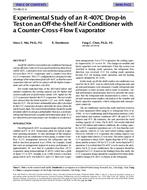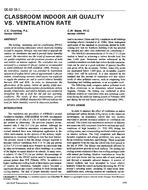Building and HVAC&R design professionals are being required to evaluate numerous design alternatives and properly justify their final conceptual selection. This trend, coupled with the retirement of experienced designers, increasing complexity of energy price structure, and unwillingness of clients and building owners to commit additional funds to the design phase itself, can only be satisfied by approaching the conceptual design process in a more scientific, comprehensive, and rational manner as against the current empirical, and often ad hoc, approach. Knowledge-based expert systems (KBES) offer a promising solution to this problem of conceptual design. Numerous KBES studies are available in the ASHRAE and allied literature that relate to areas such as diagnostics, energy consumption analysis, maintenance, and operation. Relatively little exists in using knowledge-based systems for HVAC&R conceptual design. This paper consists essentially of two sections: a background on artificial intelligence (AI) methods and a literature review of KBES applied to engineering design. The purpose of this literature review is not to cover all areas where KBES can be applied but to focus on the specific area of conceptual design involving synthesis of HVAC&R components. A subsequent paper will present and illustrate a new methodology based on a combination of KBES and algorithmic tools that allows the rational conceptual design and selection of secondary and primary components of HVAC&R systems.
Units: None
Citation: ASHRAE Transactions, vol. 109, pt. 1
Product Details
- Published:
- 2003
- Number of Pages:
- 15
- File Size:
- 1 file , 250 KB
- Product Code(s):
- D-16773


